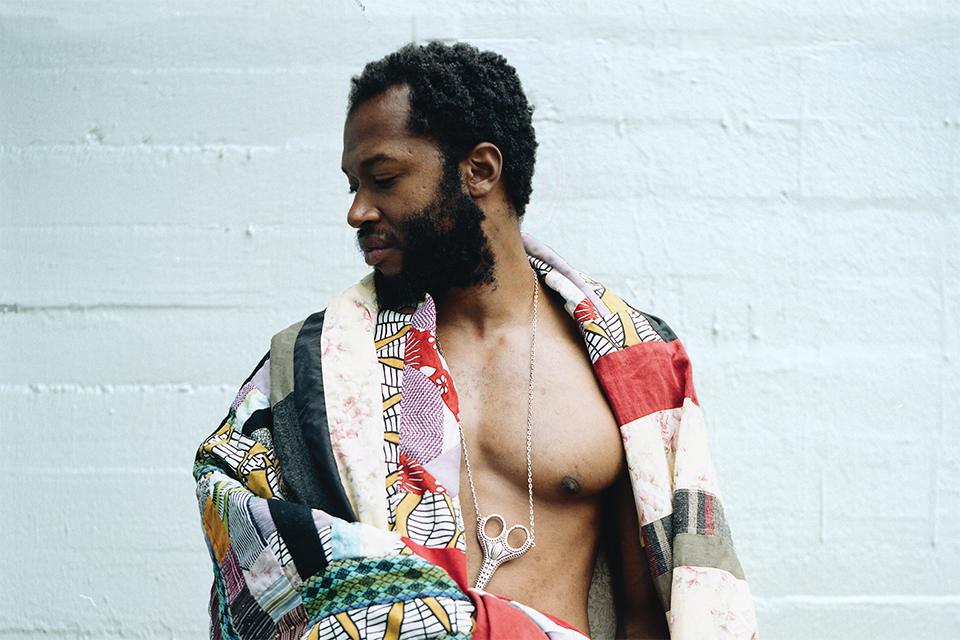Outside Basil Kincaid’s porch, the skies are wet with rain-soaked clouds, but the chill of another winter day ends outside the door. Inside the white cottage, a rainbow of technicolor fabrics line the wooden walls and floors. Deep violet velvets, bleached denims and moss green textiles mix with the sounds of low-fi instrumental jazz and spring bird chirps as Basil pedals a sewing needle across narrow strips of earth-toned corduroys. Basil sits at a brightly lit sewing table wearing pink socks, black shorts and a black cotton sweatshirt inscribed with the word WORTHY in pink sparkle font.
When asked how the past years of awards, residencies and global art shows has changed Basil, the clacking stops on a smile.
“It feels like I’m playing again,” says Basil. “I felt at odds with making art as a job for the first time. I’ve always worked harder at art than any other job I’ve had, but now it feels natural and effortless. I’m trusting my intuition.”
It is that artist’s intuition that resonates so deeply in Basil’s work. The worlds Basil creates are patchworks of black generational reclamations of black grandmothers sewing, of black cotton farmer grandfathers and of the suffering, survival and resilience of the black diaspora in America through the mediums of quilting, photography, collage and performance art.
“I don’t feel making art is a choice,” says Basil. “People may sell it, but this was in us before people called it art.”
Basil’s collages began after teaching a collage unit to middle school kids in New Orleans.
“I thought these kids should learn about collage, and I wanted them to see examples of black people being artists,” says Basil. “They started breaking conventions and creating collages of their own. I was entirely inspired by those kids.”
This led Basil to cutting and arranging images with photography instead of glue, resulting in surrealist galaxies imposed on black faces, bombs of floral patterns, and high-fashion ghosts haunting cities, fields and woods.
The sewing machine continues clacking as the topic spindles into the spiritual realm of dreams.
“The quilting started with a dream,” says Basil. “I was walking through the streets of St.Louis as l felt a sensation leading me. I saw my grandmother, Eugenia Kincaid, standing on the porch of a two-story red brick house, and out of her body flowed a yellow aura of gold liquid light. Her energy force washed over me in waves, and behind her the whole house was wrapped in a quilt. The next day, I asked a friend to teach me how to sew.”
Basil explains how quilting work stitches a sense of belonging to home.
“I keep this tradition alive, because the women throughout my family for generations made quilts, but in my generation, nobody was doing it,” says Basil. “My art is a reflection and an uplifting of my family. I want these women who were never regarded as renowned artists to have the respect they deserve. Carrying the quilt is having them with me.”
Basil’s materials are donated fabrics or found thrifted secondhand clothing and sometimes even manifest into what Basil titles self-portrait quilts made from cut and stitched scraps of Basil’s old clothes.
Basil’s work has been shown across the world from New York City to Greece to Dallas to London to Ghana and of course across the arts community of St.Louis where Basil feels most inspired.
“The city itself has an energy level that is unmatched,” says Basil. “I fight the idea that as an artist you have to go somewhere else to get what you want.”
Basil also defines these works as cultural practices, rituals and ceremonies that centers generational memories tied to black experiences of family, labor and self-love under capitalism.
We talk of how art has the ability to not only empower us but to heal us.
“Art is a particle exchange,” says Basil. “It makes you feel less alone. It is a sense that there is more to you than what exists in the body. There is a lot of beauty, joy and peace into putting action into the belief that reclaiming self-worth is enough. Art is just one aspect of that.”
Basil stops sewing, and the room becomes silent with deep reflection and emotion as Basil rolls the rusted red and brown fabrics between fingers.
“In the face of fear doing what your spirit is called to do, that feels really good, and I don’t want to squander any moment of it.”
Basil becomes silent as the clacks of the sewing machine start again.
